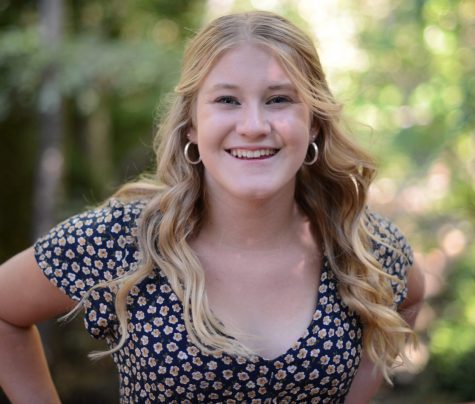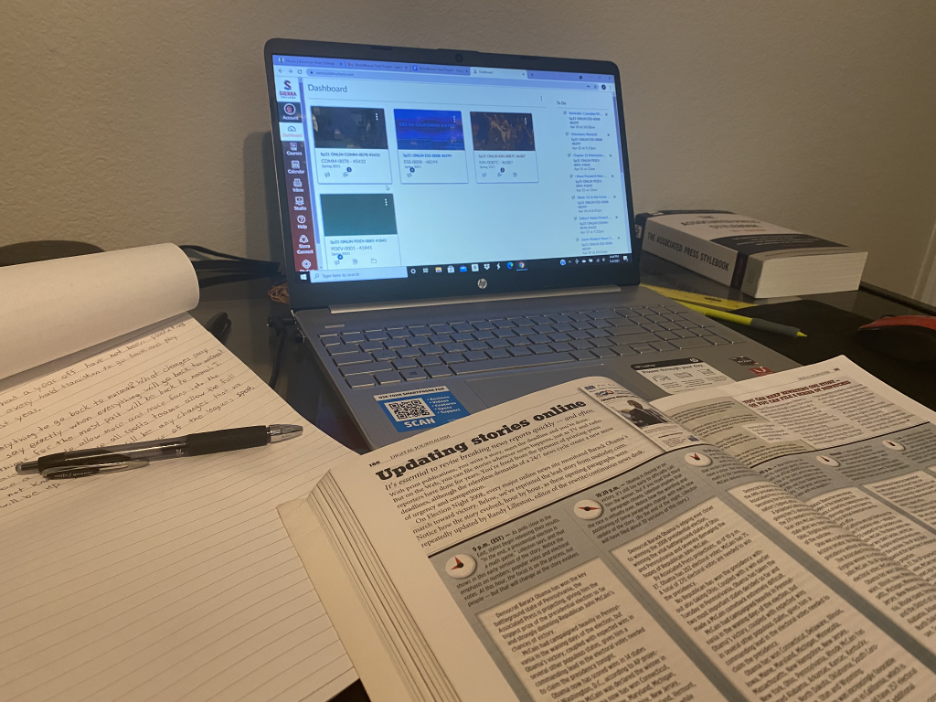Thirteen years of schooling spent looking forward to the dream “college life.” Meeting new people, experiencing new things, finding ourselves, and grasping for a small amount of freedom. What none of us expected was a global pandemic causing those 13 years of schooling to lead up to sitting behind screens.
The ironic part is that most teachers and role models would always tell us to get our faces out of our screens, but now that’s one of our only options to further our education, especially here in California.
People go to college for a multitude of reasons, some of which could be educational or a more explorational experience. Sometimes that reasoning can change.
Twenty-one year old, fourth year Sierra College student Zoe Fink’s reason for pursuing a secondary education was more on the educational side, wanting to even the playing field in the career world.
“Most jobs require some form of college education,” she said.
Eighteen year old former Sierra College freshman Grace McDaniel claimed her motivations for continuing her education have changed over the last year.
“My motive initially for pursuing secondary education was that I was hoping to work in a field in which a bachelor’s degree was required,” she said. “My motive now is just to continue exploring different career options and figuring out what I want to do in the future.”
A Picturesque College Life
Growing up, we’d watch movies that would depict college life as “some of the best years of our lives”. We’d see roommate squabbles and parties and the late night adventures to nowhere. That is what many looked forward to, but as we know, what we see on the screen is almost never reality.
When asked to describe the dream college life or traditional college experience people had a multitude of different perspectives, but all seemed to resonate the same idea.
“When I envisioned my dream college experience, it was learning lots, making memories and making friends,” explained Fink.
Eighteen year old, former Sierra College freshmen, Matthew Phipps disagreed with Fink.
“College is about getting a degree, not the friends you make on the way,” said Phipps.
For college freshmen, they lost half of their senior year and there was a tough decision to make because everyone believed that we would be back to normal by the summer. Most made hopeful decisions crossing their fingers that their school would be in person for the fall 2020 semester but when it came to it they weren’t; only four percent of the nations colleges opened their campus for in person learning.
Some were then forced to make the quick decision to attend a community college because of tuition fees staying the same even without the benefits or experience of being in-person.
“I was registered to attend a four year university before COVID started,” said McDaniel. “I changed my mind and registered for classes at Sierra because my university classes were all going to be online and tuition would not be any different than a normal year.”
Others who had left college earlier on in their lives saw the pandemic as an opportunity to return to the classroom virtually.
“Covid pushed me to restart community college,” said twenty-one year old Sierra student, Taylor Gilbertson.
Mixed Feelings on Distance Learning
So how do students feel about distance learning and how is it affecting them?
“I think for some classes it can make them easier and more efficient,” said Fink. “But it does make other classes way more difficult, especially since I am a hands-on learner.”
Others agreed and held similar mixed feelings.
“Online college isn’t bad,” said Phipps. “I kind of liked how well it works for some courses. But harder courses do need to be in-person.”
“I have mixed feelings about distance learning,” said McDaniel. “I enjoy having in-person classes, and I really would prefer them this way, but I’ve found that as long as my online classes are asynchronous with no video calls I don’t seem to mind them that much.”
In an 8-minute interview conversation, three Sierra College students discuss their views on distance learning in a similar vein:
Taylor Gilbertson sums up the sentiment, “I have mixed feelings. It allows me to have more time for other things, but certain classes are difficult.”
Students suggested changes to distance learning to better assist students.
“Educate the teachers on newer technology so they can improve their online teaching,” offered Fink.
Some moved out of state in search of a more traditional in-person college experience.
“I did not really think about dropping out entirely until campuses re-open, but I did transfer to a junior college in an area with fewer Covid restrictions that could offer me in-person classes as well as in-person sports, clubs, and events,” said McDaniel.
Statistics: Covid, College, and Mental Health
COVID-19 got rid of the traditional college experience while also increasing mental health problems, and as a result, created a higher dropout rate.
According to a study in June 2020, 75% of college students reported feeling more anxious and stressed due to online learning. Now with only 4% of colleges fully reopening, online school has made this emotional stress the new normal.
According to the Center for Disease Control in June 2020, forty percent of U.S. adults reported struggling with mental health and substance use problems.
In a report from Chegg.org, the research and advocacy portion of the student services company with the same name, alongside four youth mental health advocacy and suicide prevention organizations released on September 10 2020, found that 58 percent of college students surveyed said they were “moderately,” “very” or “extremely” worried about their personal mental health. Zoe Fink reflected:
I have thought about dropping out so many times, I have gotten so frustrated with wifi, the overload of work and not being able to focus.
Fink continued, “I find it harder to focus, sometimes when not in a classroom and the lack of focus makes me stressed and makes me feel panicked that I can’t find enough time when I procrastinate.”
Students who feel this way or see any downward trends in their mental state should make an appointment with their counselors and take advantage of all resources their college has to offer.
Stressed out and dropping out, college students are definitely feeling the toll of the pandemic.
According to Eductiondata.org, “In the United States, the overall dropout rate for undergraduate college students is 40%, with approximately 30% of college freshman dropping out before their sophomore year.”
According to another study done by Educationdata, there has been an increase in dropouts between 2019 to 2021.
Even if the students themselves only considered the possibility of dropping out, many knew someone who had dropped out due to the Covid-19 pandemic and continued online “distance” learning.
“I do know a few people that have dropped out due to schools continuing online instruction,” stated McDaniel.
Taking a gap semester might be the right choice for some students with the current life situation.
“I dropped out because I wasn’t mentally ready for college,” said Phipps. “ It was more of the fact that I wasn’t able to see people that was tough for me.”
Phipps explained he does have plans to return to the classroom eventually.
“I will go back and cut the amount of work time I have in a week so I can apply myself more appropriately to it,” he continued.
The Question Remains: Is it Worth it?
“I think that college is definitely worth it without a traditional college experience,” stated McDaniel. “My opinion is that people should go to college to get a degree, and living on campus with friends sounds like a good time but shouldn’t change a person’s educational goals.”
“It has to be done regardless,” agreed Gilbertson.
Gaining a normal college education can be hard for a lot of students but when exasperated by the pandemic it can be even more difficult. On the flip side of the coin it can be even more difficult to earn your degree after taking a gap year according to The Hechinger Report.
For those motivated solely by pursuing a secondary education college without the experience, it is worth it. For those motivated primarily by the social or self discovery aspect, or for those who work better in a group setting, the appeal to take a break and find a way to better spend your time may be the temporary solution until the world becomes slightly more normal again. With an increase of vaccines and a downward trend in cases, hopefully a semi-normal college experience will be a reality in the near future.
With all that being said, whatever choice you make can have a lasting effect on your future, so make sure to consider all the factors and make the choice that is going to be the best for you, your education, and your mental health.


Written by Morgan Ham | Podcast and featured photo by Austin Darneille
